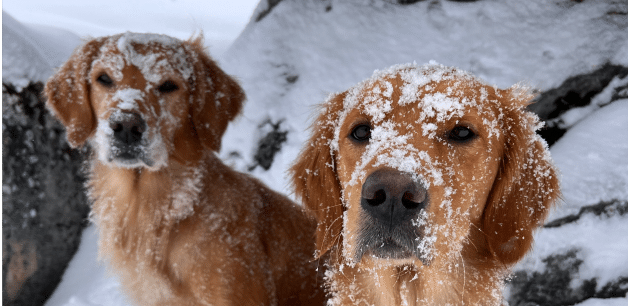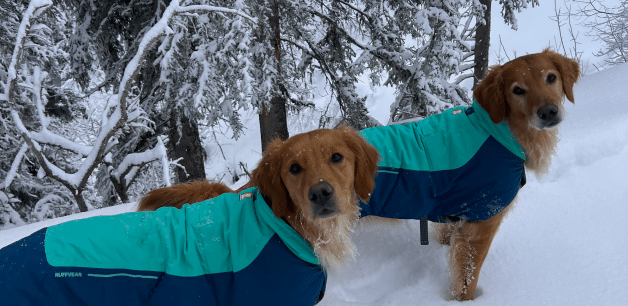The joy of snow
As someone who spends a lot of time outdoors with my pack of six, I know how magical snowy walks can be. Watching them bound through frosty fields is one of my favourite times of year. But when it’s snowing, dog walks aren’t all fun and games, and it’s essential to think about snow safety for our dogs.
In this blog, I’ll share some key lessons I’ve learned over the years. Including how I keep my pack safe, warm, and happy in the snow, plus a few tips that can help your dog enjoy winter as much as mine do.

Snow safety for dogs: breed matters!
Not all dogs handle cold weather the same way. Long-haired or double-coated breeds, like golden retrievers, often have a bit more natural insulation against snowy temperatures, while short-haired breeds may need extra help to stay warm. My cocker spaniels, for example, don’t have the same thick coat as my retrievers, so I’m always more mindful of ensuring they’re warm enough when out and about in frosty weather.
Before venturing out, consider your dog’s breed and tolerance to cold temperatures. It’s a good idea to keep walks shorter for breeds less suited to snow.
Protect your dog’s paws
Snow and ice can be harsh on paw pads. Ice balls can form between the toes of long-haired dogs, causing discomfort or even injury. For this reason, I keep my pack’s nails trimmed and the fur between their toes neatly clipped during the winter months.
I also recommend applying paw balm or vaseline before and after walks to keep your dog’s paws protected and moisturised. This helps prevent cracking and keeps the pads supple despite the cold weather.
After snowy walks, always check for signs of irritation, such as redness or swelling, and clean their paws thoroughly to remove ice, rock salt, or any toxic substances like antifreeze. These can be harmful if licked.

Keeping your dog warm and dry
A key part of snow safety for dogs is maintaining their body temperature. After walks in the snow, I always dry my dogs off with a towel to make sure they stay warm and dry. It’s especially important for short-haired breeds, as they can get chilled more easily.
For longer outings, consider investing in high-quality winter gear like dog boots and coats. Keeping them comfortable ensures they’ll enjoy their time outdoors just as much as you do.
Here are some of my top safety tips for winter walks:
Monitor body temperature
Watch for shivering or reluctance to move – both can indicate your dog is getting too cold.
Avoid toxic substances
Be cautious around roads and pavements treated with rock salt or antifreeze, as these are toxic to dogs.
Hydration matters
It might be cold, but your dog still needs to stay hydrated. Offer fresh, room temperature water regularly.
High-visibility
As magical as it is, snowy weather can reduce your visibility. Invest in a reflective dog coat or LED collar if venturing out into the snow. This will ensure your dog can stay safe and seen!
Cold weather alternatives
If it’s too snowy for outdoor adventures, don’t worry – indoor games are a lifesaver during the winter months. My dogs love a good snuffle mat or a game of hide-and-seek with high-protein treats.
These activities can keep them mentally stimulated and entertained when it’s not safe to be outside.

A final word on winter walks
Whether your dog loves the snow or needs a bit of convincing, it’s always worth preparing for the winter months. Keeping them warm, protecting their paws, and monitoring their body temperature will ensure they can enjoy the season safely.
I hope you’ve found this blog useful! As always, if you have any thoughts or questions, feel free to contact me at James@ella.co, I’d love to hear from you.
Stay safe out there!
James x
